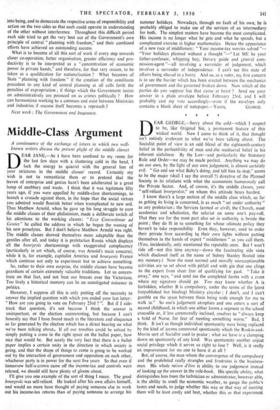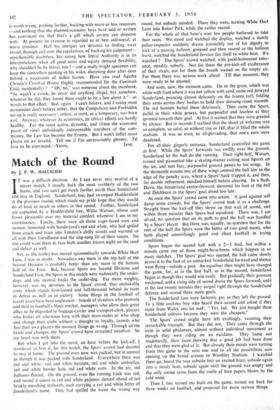Middle-Class Argument
A continuance of the exchange of letters in which two well- known writers discuss the present plight of the middle classes
DEAR JANE,—As I have been confined to my room for the last few days with a shattering cold in the head, I lack the energy to quarrel with the general line of your strictures in the middle classes' record. Certainly my wish is not to romanticise them or to pretend that the leaven of enterprise and genius hasn't been adulterated in a great lump of snobbery and waste. I think that it was legitimate fifty years ago, if you were appalled by middle-class shortcomings, to launch a crusade against them, in the hope that the social virtues you admired would flourish better when transplanted to new soil. Thus Matthew Arnold, when he gave up his long struggle to cure tEe middle classes of their philistinism, made a deliberate switch of his attentions to the working classes: "Ecce Con vertimur ad Genies" he called the address in which he began the wooing of his new proselytes. But I don't believe Matthew Arnold was right. The middle classes showed themselves more adaptable than the gentiles after all, and today it is proletarian Russia which displays all the bourgeois shortcomings with exaggerated complacency (particularly in art which, of course, was Arnold's main concern), while it is, for example, capitalist America and bourgeois France which continue not only to experiment but to achieve something.
So, rather to their own surprise, the middle classes have become guardians of certain extremely valuable traditions. Let us concen- trate on that fact, and not beat our breasts over the Victorians. Too lively a historical memory can be an unmitigated nuisance in politics.
However, I suppose all this is only putting off the necessity to answer the implied question with which you ended your last letter: "How are you going to vote on February 23rd ? ". But if I side- track that question, it's not because I think the answer is unimportant, or the election uninteresting, but because I can't honestly say that I have found much in the literature and eloquence so far generated by the election which has a direct bearing on what we've been talking about" If all our troubles could be solved by simply putting a cross in the right space on the ballot paper, how nice that would be. But surely the very fact that there is a ballot paper implies a certain unity in the direction in which society is going, and that the shape of things to come is going to be worked out by the interaction of government and opposition on each other, whichever party is in power for the next five years So that even if tomorrow half-a-crown came off the income-tax and controls were relaxed, we should still have plenty of gloom about.
I'll give you one example of the sort of thing I mean. The good bourgeois was self-reliant. He looked after his own affairs himself, and would no more have thought of paying someone else to work out his income-tax returns than of paying someone to arrange his summer holidays. Nowadays, through no fault of his own, he is probably obliged to make use of the services of an intermediary for both. The simplest matters have become the most complicated. His income is no longer what he gets and what he spends, but a complicated exercise in higher mathematics. Hence the appearance of a new race of middlemen: "Your income-tax worries solved "- "Your holidays planned without a thought "—" Let ME be your father-confessor, whipping boy, literary guide and general com- mission-agent "—all involving a surrender of judgement, which involves a surrender of independence. I can't see this state of affairs being altered in a hurry. And so, as a voter, my first concern is to see the barrier which has been erected between the mechanics of government and the governed broken down. Now which of the parties do you suppose has that cause at heart ? Send me your answer in a plain envelope before February 23rd, and I will probably cast my vote accordingly—even if the envelope only
contains a blank sheet of notepaper.—Yours, GEORGE.
DEAR GEORGE,—Sorry about the cold—which I suspect to be, like Original Sin, a permanent feature of this wicked world. Now I come to think of it, that thought isn't entirely irrelevant to what we've been talking about. The Socialist point of view is an odd blend of the eighteenth-century belief in the perfectibility of man and .the mediaeval belief in his inherent sinfulness - By the Law—and particularly the Statutory Rule and Order—we may be made perfect. Anything we may do on our own, by the light of our own judgement, is almost certainly evil. "Go and see what Baby's doing, and tell him to stop," seems to be the major (shall I say the overall ?) directive of the Planned Society in its relations with what the economists humorously call the Private Sector. And, of course, it's the middle classes, your "self-reliant bourgeoisie," on whom this attitude bears hardest.
I know there's a large section of the middle class which, so far as getting its living is concerned, is as much "set under authority" as any proletarian ; the Services (armed or civil), the Church, most academics and scholastics, the salariat on some one's pay-roll. That they are for the most part also set in authority is beside the point ; they do fit in to something for whose ultimate policy they haven't to take responsibility. Even they, however, used to order their private lives according to, their own lights without putting themselves in the hands of expert " middlemen " as you call them. (You, incidentally, only mentioned the reputable ones. But ! won't ride off—not this time anyway—down the fascinating side vista which disclosed itself as the name of Sidney Stanley floated into my memory.) Now the most normal and morally unexceptionable activities are so set about with pitfall and with gin that one clings to the expert from sheer fear of qualifying for gaol. "Take it away," one says, "and send me the completed forms with a cross where my signature should go. You may know whether A is forbidden, whether B is compulsory, under the terms of the latest (unpublished but binding) Ministry circular ; / don't, and I can't gamble on the space between them being wide enough for me to walk in." So one's judgement atrophies and one enters a sort of second childhood, in which one either forms a segment in the school crocodile or, if less communally inclined, resolves to "always keep a hold of Nurse, for fear of meeting something worse." Bad, I think. It isn't as though individual spontaneity were being replaced by the kind of joyous communal spontaneity which the Ruskin-and- Morris sort of Socialist used to praise ; what we have is a clamping down on spontaneity of any kind. Was spontaneity another unjust social privilege which it serves us right to lose ? Well, is it really an improvement for no one to have it at all ?
But, of course, the man whom the convergence of the compulsory and the prohibited really strangles and frustrates is the business- man. His whole raison d'être is ability to use judgement instead of looking up the answer in the rule-book. His specific ability, what distinguishes him from the technician or administrator, however able, is the ability to smell the economic weather, to gauge the public's tastes and needs, to judge whether this way or that way of meeting them will be least costly and best, whether this or that experiment
is worth trying, pushing further, backing with more or less resources —and nothing that the planned-economy boys have said or written has convinced me that that's a gift which society can dispense with. At present its exercise is regarded as at best anti-social, at worst criminal. Half his energies are devoted to finding ways round, through and over the regulations, of backing his judgement— reprehensible doubtless, but seeing how literal Authority is in its interpretations when all good sense and equity demand flexibility, why shouldn't he be literal, too ?—and a really bright specimen can keep the controllers panting in his wake, slamming door after door behind a succession of stolen horses. Have you read Agatha Christie's Crooked House (highly recommended for the Common Cold, incidentally) ? "Oh, no," says someone about the murderee, " he wasn't a crook, he never did anything illegal, but somehow, whatever he did, they found there ought to be a law about it "—or words to that effect. Bad, again. I can't believe, and I notice most economists don't believe either, that the Compulsory-and-Forbidden set-up is really necessary ; unless, at most, as a temporary, war-born evil. Anyway, whatever its economics, its ethical effects are hardly healthy. For the most active, dynamic, and (from the economic point of view) individually indispensable members of the com- munity, the Law has become the Enemy. But I won't inflict more gloom on an invalid. Tell me if I'm unreasonably gloomy. I'd



































 Previous page
Previous page